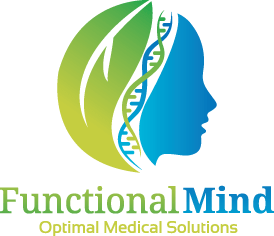
We are proud to be part of a new movement in medicine which provides a timely new way of thinking about prevention, public health, wellness, and the treatment of chronic disease that can lead to better outcomes and lower healthcare costs. Jeff Bland, MD pioneered Functional Medicine over 25 years ago which has now turned into a movement to change the face of medicine, with an Institute for Functional Medicine, a faculty and textbook to teach interested Practitioners.
Here is a short video that can sum it up quickly for you:
So what is Functional Medicine?
Treat the Underlying Cause, Not the Symptoms.
Functional medicine addresses the underlying causes of disease, using a systems-biology approach and engaging both patient and practitioner in a therapeutic partnership. Functional medicine addresses the whole person, their story and experiences and not just an isolated set of symptoms.
Functional medicine practitioners spend time with their patients, listening to their histories and looking at the interactions among genetic, diet, environmental, and lifestyle factors that can influence long-term health and complex, chronic disease. At the core of the practice of functional medicine, is the understanding that each patient is unique and requires a personalized approach to reach their peak expression of health and vitality.
Core Principles:
- An understanding of the biochemical individuality of each human being, based on the concepts of genetic and environmental uniqueness;
- Awareness of the evidence that supports a patient-centered rather than a disease-centered approach to treatment;
- Search for a dynamic balance among the internal and external body, mind, and spirit;
- Familiarity with the web-like interconnections of internal physiological factors;
- Identification of health as a positive vitality not merely the absence of disease emphasizing those factors that encourage the enhancement of a vigorous physiology;
- Promotion of organ reserve as the means to enhance the health span, not just the life span, of each patient.
 A patient-centered approach refers to health care that is respectful of and responsive to individual patient preferences, needs, and values, and that ensures that patient values guide all clinical decisions.
A patient-centered approach refers to health care that is respectful of and responsive to individual patient preferences, needs, and values, and that ensures that patient values guide all clinical decisions.
The power of the therapeutic partnership comes from the idea that patients who are active participants in the development of their therapeutic plan feel more in control of their own well-being and are more likely to make sustained lifestyle changes to put your body naturally wants to be healthy. But things needed by the body to function at its best might be missing, or something might be standing in the way of its best functioning. Functional Medicine first identifies the factors responsible for the malfunctioning. Then it deals with those factors in a way appropriate to the patient’s particular situation.
Very often Functional Medicine practitioners use advanced laboratory testing to identify the root cause or causes of the patient’s health problem. Old-fashioned medical diagnosis helps too, in the form of listening carefully to the patient’s history of symptoms and asking questions about his or her activities and lifestyle.
For treatment, Functional Medicine practitioners use a combination of nutrition and lifestyle changes first as the foundation then add natural agents (supplements, herbs, nutraceuticals and homeopathics), health coaching, spiritual/emotional counseling, and pharmaceuticals, if necessary to prod a patient’s physiology back to an optimal state. In addition, educating the patient about their condition empowers them to take charge of their own health, ultimately leading to greater success in treatment. The purpose of supplements is act as a bridge to provide nutrients until one can begin doing so through food. Some have genetic predisposition for a higher need of certain supplements and may need to continue a few supplements long term. At Functional Mind, LLC, we find that many people feel sick because of side effects of medications being treated with more medications or drug to drug interactions.
Treating Symptoms versus Treating the Person
In the present health care model today, medication is used to suppress people’s symptoms. If the patient stops taking the medication, symptoms generally return.
 Functional Medicine approaches health problems differently. Instead of masking the problem, it aims at restoring the body’s natural functioning. Although some Functional Medicine practitioners may prescribe pharmaceuticals, they are used to gently nudge the patient’s physiology in a positive direction so the patient will not need them on a long term basis.
Functional Medicine approaches health problems differently. Instead of masking the problem, it aims at restoring the body’s natural functioning. Although some Functional Medicine practitioners may prescribe pharmaceuticals, they are used to gently nudge the patient’s physiology in a positive direction so the patient will not need them on a long term basis.
It’s also important to note that in Functional Medicine, the treatment plan for similar symptoms might vary tremendously for different patients, according to their medical history and results of laboratory tests. Factors that can come into play in producing the same symptoms include vitamin deficiencies, food intolerances, environmental exposure, pathogenic bacteria, parasites, chronic viral pathogens, structural abnormalities, and last but not least emotional toxicities like anger, shame, fear or guilt.
The Costs
The healing methodology offered by Functional Medicine can be costly. There are many factors, tools, and expertise at work in order to get to the roots of a patient’s health problems. But while the financial load can add up quickly at first, it can often prove to be extremely cost effective in the long run. Patients who suffer from chronic and persistent conditions often find that the costs of treating symptoms into the future are much more than the costs to understand or even alleviate a problem in the present.
What to Expect
When you consult a Functional Medicine practitioner, the first step is taking a thorough history. The process begins with a 39-page intake form, completed online, that asks detailed questions about your medical and emotional history including the dates and context of major life events. It will also ask you to keep a 3-day food diary and to perform some relatively simple do-it-yourself assessments of your current health state. Practitioners are trained on how to unravel and put the puzzle pieces of a complicated and intertwining story together. Generally clues in the story lead to the identification of key imbalances.
The next set of clues comes from advanced laboratory testing. Innovative, state of the art lab tests help the practitioner look deeply into a patient’s physiology to identify how it has been compromised and how physiological balance can be restored.
